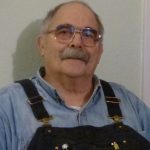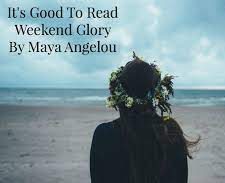EDITOR’S NOTE: Jim has an interesting take on how racist views (or the lack of racism) might come about through ancestral memories. In true Jim style, it’s an interesting story about coming of age, military life and much more. As we embark on Black History Month, join Jim as he finds out what it means to be Black on a Saturday night.
 By Jim Heffernan
By Jim Heffernan
I think “Weekend-Glory” * might be my favorite Maya Angelou poem, maybe it’s because she talks of working in a factory and inequality. It ends up in these lines:
I’m not on top
but I call it swell
if I’m able to work
and get paid right
and have the luck to be Black
on a Saturday night.
It’s a long story, but I feel lucky that at one point in my life I was “black” on a Saturday night. Nothing changed about the color of my skin, but inside my head I was definitely black.
Somehow, I’ve always found it easy to get along with and relate to black people.
It may sound weird, but I believe I got to that state because my father’s grandparents were Irish Catholics who emigrated here in the mid 19th. century and because at age 17 I liked the movies better than high school.
What do my father’s grandparents have to do with becoming black on a Saturday night?
Well, this could be pure supposition, but in 19th. Century Ireland, Catholics were, by law, restricted from certain basic rights such as voting, owning property, and education. They were, in effect, a lower caste in the stratum of society. Really, they were treated very much like whites have treated blacks since before and after Reconstruction days in this country. The Ku Klux Klan included blacks, Jews and Catholics in their list of menaces.
I believe that an ancestral memory of the mindless discrimination inflicted on my great grandparents somehow forged within me a sense of kinship with black people. I could be wrong, maybe I was just never taught to fear others that were different from me.
The part about the movies is absolute truth. At 17, me and my “hoodlum friends” would often ditch school and go downtown to the 11AM matinee. “Taras Bulba” and “Liberty Valence” were much more interesting than American History and 11th. Grade English.
I think we actually liked our scam better than the movies. Two of us would lurk by the exit door while I (why always me?) went to the front and bought a ticket. When the house lights went down, I would crawl to the exit door and let my confederates in. The theater never caught us, but the school sure did report our absences.
Eventually, my truancy and other transgressions led to my father running out of patience. When he snapped, he insisted I join the military. My father was a very wise man and, given my addle pated adolescent mind, it was the best thing he could have done.
Growing up, I was very isolated from blacks. I don’t think it was anything we thought about, it just happened that way. There were no blacks in my block, my school, or my church. Denver had its “Five Points” neighborhood where you could see a lot of blacks, I kind of thought they all lived there because it was their choice, kind of like most of the Italians living in the parish next to mine.
The only interchange with a black person I can remember before the military must have come when I was about 14. I was hanging around the amusement park across the street and a black boy about my age seemed to be waiting for a ride. I asked him where he was from and he told me Watts, California. We talked a bit, then his ride came and that was that.
I did have a strange experience just before I enlisted. Me and my hoodlum friends were plied with liquor by some “cool guys” we met downtown. Before the liquor quite did its job, we realized they were after sexual favors. We made our escape, seething with anger.
The following week, we returned to the house with mayhem on our minds. We barged in the door and the one man that was home ran out the backdoor. Instead of chasing him, we elected to vent our anger on the house. We broke every dish, mirror, and cabinet door we could find. It felt good for a little while, then we began to wonder if we may have earned ourselves a trip to the reformatory.
We hit on the brilliant plan of blowing town and heading to Florida. We didn’t have a lot of cash, but we figured our finely tuned talents for larceny would get us through.
A few days later, we were in Kentucky at the house of Billy’s Grandmother. She seemed a very sweet old lady and she treated us very well, wonderful cook. What really sticks in my mind is the shock I felt when she said in the most matter-of-fact voice, “He’s a good hound dog, but he sure can raise a ruckus if he smells a n****r.”
We did make it to Florida and made it back, only being jailed a couple of times. Our parents were informed when we hit Kentucky and not again until the Sheriff at Goodland, Kansas called to verify our identities. After our return, I was busted once more for ditching school and my father presented me with the choice of the streets or the military. I opted for the Air Force.
The Air Force was very different. Blacks were everywhere, and sometimes in charge. I do not believe I was ever in a barracks or class or outfit that did not include diversity. In private, sometimes a guy would grouse about blacks, but not often and not very loud. I couldn’t fathom the reasoning and put it down to ignorance.
In Basic Training, the guy in the bunk next to mine was a black guy from Georgia, a little older than me (everybody was older than me, I was the only 17 year old in the barracks). Sometimes, while we were shining our “brogans”, we would talk together about the girls back home we were missing. Our accents differed, but our hearts were the same.
My real racial education came in 68 and 69, during the last year and half I spent in England with the Air Force. The base rented an apartment complex 20 miles away to use as base housing. I was lucky enough to land a 2 bedroom unit that was perfect for my pregnant wife, my son, and I. It also had 2 bathrooms, a garage, central heat and appliances, not common in England those days. All told, there were 48 2-bedroom units and 48 1-bedroom units.
I didn’t take a survey, but there must have been close to 200 adults and probably 75 children once it filled up. I think about 60% of us were white and the rest black. We had all been living “on the economy” in mostly run-down apartments and houses that were somewhat primitive by American standards.
I remember living in the apartments as an idyllic experience. The village was very small with just two shops and a pub. In an odd coincidence, we had spent our first six months in England in the same village. In that time we lived in a very picturesque gatehouse that straddled the entrance to a large estate. The gatehouse turned out to be very cold and more money than we could afford. When the lease ran out, we moved to a house in the country that was closer to the base and affordable, but heating a house with coal and kerosene was miserable. We were very glad to move to the apartments.
Besides the comforts of central heating and a second bathroom, the apartments offered a social benefits I never knew before or since. There was always someone willing to share coffee or play cards with. There were several of the apartments that served as gathering places for anyone up for coffee or conversation.
Wanda’s apartment seemed to draw the biggest crowd. She was warm- hearted and welcomed everyone. Wanda was married to a master sergeant and a little older than most of us. I guess you could say she was sort of a surrogate mom to all the women away from home.
Wanda’s is where my wife met Roni, a white German woman. Roni was married to Gene, a black aircraft mechanic. They had two children close to the age of our son and the children got along very well. My wife and I started playing Pinochle with them every Friday night. It was almost as good as going out and no babysitter.
Our Pinochle games led to us being invited to Gene’s birthday party. Around 9, the women put the children to bed as best they could. Most of them left the party. My wife went home with our son. One of the guys suggested we go to his place and listen to jazz and have some drinks. I was not the least bit tired and went with the group. I think there were about 10 of us. Everybody but me was black. The only ones I can now name are Gene and Dr. Bailey, a mountain of a man who was also my wife’s obstetrician.
Somehow the stars aligned to make it a magical event that lasted until about 4 in the morning. There was a lot of laughter and a lot of jazz. I called it a cacophony and got laughs of my own. If I made a spectacle of myself, nobody shamed me for it.
I hope I’m remembering it correctly. In any case, I remember that night fondly. I think of it as the one time in my life that I was able to be “black on a Saturday night.”
I’ve missed blacks being at least some part of my life since I’ve moved to Tillamook. I’m acquainted with a couple of black women here, but I see them very infrequently. I spent about a week being somewhat depressed because there were no blacks in my life. Then it hit me, my brother’s wife is black. I don’t think of her as black, she’s just herself. I think that’s the place we really need to go. Black and white are just artificial labels that we should just discard and move on.
I can’t improve on Isabel Wilkerson when she says, “In the making of the New World, the Europeans became white, Africans black, and everyone else yellow, red, or brown. Humans were set apart and identified solely in contrast to one another and ranked in an arbitrary manner by the people in power. It was in the process of ranking that we were all cast into assigned roles to meet the needs of the larger production; none of us are ourselves.”
* Full text of poem can be found at https://allpoetry.com/Weekend-Glory


